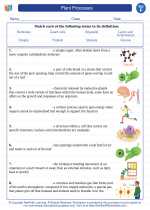Plant Processes
Plants carry out various processes to survive and thrive. These processes include photosynthesis, transpiration, respiration, and transportation of nutrients. Understanding these processes is essential for comprehending the functions of plants.
Photosynthesis
Photosynthesis is the process by which plants use sunlight, carbon dioxide, and water to produce glucose and oxygen. It occurs in the chloroplasts of plant cells and is essential for the plant's survival. The equation for photosynthesis is:
6CO2 + 6H2O + sunlight → C6H12O6 + 6O2
Transpiration
Transpiration is the process of water movement through a plant and its evaporation from aerial parts, such as leaves, stems, and flowers. It helps in the absorption of water and minerals from the soil and also cools the plant. Transpiration is driven by the process of evaporation and the plant's need for water.
Respiration
Respiration in plants is the process of releasing energy from glucose. It occurs in the mitochondria of plant cells and uses oxygen to break down glucose, releasing carbon dioxide, water, and ATP (energy). The equation for respiration is:
C6H12O6 + 6O2 → 6CO2 + 6H2O + ATP
Transportation of Nutrients
Plants transport water, minerals, and sugars through their vascular system. The xylem transports water and minerals from the roots to the rest of the plant, while the phloem transports sugars produced during photosynthesis to where they are needed. This process is essential for the distribution of nutrients and the overall health of the plant.
Study Guide
- Define photosynthesis and explain its significance in plant life.
- Describe the process of transpiration and its role in plant physiology.
- Differentiate between respiration and photosynthesis in plants.
- Explain the importance of transportation of nutrients in plants.
- Discuss the impact of environmental factors such as light, water, and temperature on plant processes.
By understanding and mastering these plant processes, you will gain a comprehensive understanding of how plants function and thrive in their environment.
.◂Science Worksheets and Study Guides Sixth Grade. Plant Processes
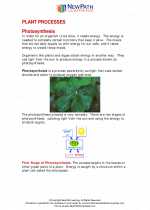
 Activity Lesson
Activity Lesson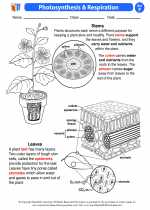
 Worksheet/Answer key
Worksheet/Answer key
 Worksheet/Answer key
Worksheet/Answer key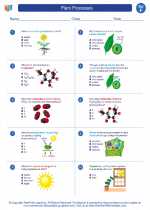
 Worksheet/Answer key
Worksheet/Answer key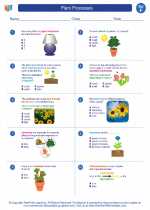
 Worksheet/Answer key
Worksheet/Answer key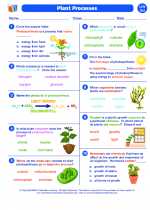
 Vocabulary/Answer key
Vocabulary/Answer key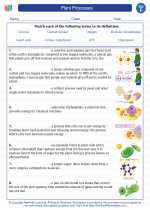
 Vocabulary/Answer key
Vocabulary/Answer key